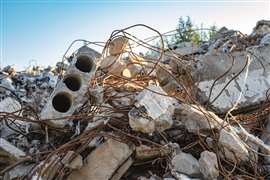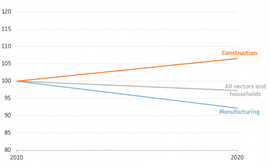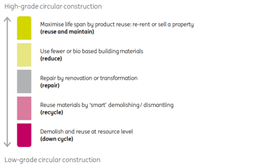Why is European construction generating more waste, not less?
14 June 2023
 Construction waste (Image: AdobeStock)
Construction waste (Image: AdobeStock)
Unexpectedly, the construction industry in Europe has seen the level of waste it generated over the last decade grow, at a time when it should have been shrinking.
That’s according to research by Dutch bank ING, which found that the amount of waste construction generated in the Eurozone between 2010 and 2020 rose by 6%.
Materials classified as construction waste included concrete, wood, metal, bricks, insulation, glass and plastics. In 2020, construction contributed 37% of all the waste in the European Union.
That was at the same time that the overall amount of waste generated in the region fell by 3%. Meanwhile the manufacturing industry managed to cut waste by 8% over the same period.
 Development total waste generation in EU-27 in absolute tonnes (not corrected for production volume development), Index 2010=100 (Eurostat, ING Research)
Development total waste generation in EU-27 in absolute tonnes (not corrected for production volume development), Index 2010=100 (Eurostat, ING Research)
The picture looks even worse for construction when you consider that production levels in the sector fell by 7.6% between 2010 and 2020, while total economic activity grew by 8.1%.
ING has offered two possible reasons why construction has been generating more waste at a time when other sectors are cleaning up their act:
1) Amid a shortage of workers, construction companies are opting for new materials instead of reusing old materials. The re-use of old materials can be more labour intensive and companies appear to be saving on labour by choosing to discard them instead.
2) The share of the renovation and maintenance market has increased in recent years. ING suggested that the demolition and removal of existing materials in renovations meant that they often generate more waste than new construction.
 The difference between high and low-grade circular construction (Eurostate and ING Research)
The difference between high and low-grade circular construction (Eurostate and ING Research)
Some countries within the EU perform better than others when it comes to recovering construction waste. In the Netherlands, 100% of waste is recovered, compared to an average of 89% across the EU-27 and 73% in Spain.
But ING questioned whether this represented high-grade or low-grade circular construction – figures on the circularity rate within construction aren’t currently available for the EU.
To read ING’s full report on construction waste in Europe, click here.
Changes in regulations on the way
The news comes against the backdrop of changing regulations in Europe.
The European Commission is preparing a number of measures to make sustainable products the norm.
The initiative includes the revision of the Construction Products Regulation, which aims to make the design and manufacture of construction products more durable, recyclable and easier to re-use.
The existing Construction Products Regulation aims to ensure that products can circulate around the European Single Market freely and provide harmonised rules on how to express their performance in relation to essential characteristics like how they reactor to fire, conduct heat or insulate sound.
But the European Commission wants to revise the Regulation to address the sustainability performance of products, as well as embracing the sector’s digital transformation.
It said, “The current Regulation is not fit to deliver on broader policy priorities, particularly on the European Green Deal.”
Under the proposed revised regulation, manufacturers will have to deliver environmental information about the lifecycle of their products.
The European Parliament would also have the power to set rules on green public procurement.
Other obligations within the revised Construction Product Regulation include:
- Design and manufacture a product and their packaging in such a way that their overall environmental sustainability reaches the state-of-the-art level;
- Give preference to recyclable materials and materials gained from recycling;
- Respect the minimum recycled content obligations and other limit values regarding aspects of environmental sustainability;
- Make available, in product databases, instructions for use and repair of the products;
- Design products in such a way that re-use, remanufacturing and recycling are facilitated.
The European Construction Industry Federation (FIEC) has welcomed news that the “direct installation” of construction products would be excluded from the scope of the revised Regulation.
But the “de-installation” of products and “services” will be covered by the new rules.
FIEC warned that these could potentially cover activities applying to contractors and create “legal uncertainty”.
It also requested a different procedure than “delegated acts” for setting rules on green public procurement contracts, with more power given to member states in this area.
And it called for “simplified, pragmatic procedures” where manufacturers are “responsible and trusted for their declarations”.
It not clear at this stage exactly when the revised Construction Product Regulation could come into force. Further discussions are set for September after a plenary vote in the European Parliament on the proposals in July.
But the transition period from the current Regulation to the revised version is likely to be quicker than foreseen in the initial proposal from the Commission, FIEC said.
MAGAZINE
NEWSLETTER
CONNECT WITH THE TEAM






